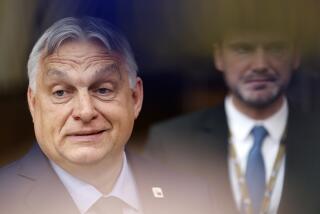Parliament of Europe Looks to Expand Role
- Share via
STRASBOURG, France — The brightly lit circular chamber where the European Parliament meets is in a dramatic, modern building that seems a fitting place for making decisions that shape Europe’s future.
The flaw in the symbolism is that the building, the Palais de l’Europe, does not belong to the European Parliament. It is rented from the Council of Europe.
In effect, then, the intended symbolism works in reverse: The fact that the Parliament has no permanent quarters reflects the nomadic, impotent nature of the institution.
The European Parliament meets here for one week of every month--except when it is on its long summer break--but its administrative staff is based in Luxembourg, and its 18 specialist committees meet for two weeks a month in Brussels.
As a consequence, about 5,000 “Eurocrats”--members of the Parliament, interpreters and secretaries--shuttle from Strasbourg to Luxembourg to Brussels, at an annual cost of $45 million.
“Some critics say that this is the world’s biggest movable cocktail party,” one official observed.
Still, many political commentators believe that the European Parliament, the legislative branch of the European Communities, is at long last coming into its own. As Lord Plumb of Britain, the Parliament’s president, put it recently:
“With the Community approaching the goal in 1992 of a ‘single Europe’--that is, with internal barriers erased--we here have more power and influence, because we are directly elected by 320 million Europeans.”
Lord Plumb, the former Henry Plumb, an affable farmer from southwestern England, went on to say that “our role in approving the European Community budget will be increasingly important, but it certainly would be helpful if we had one common workplace.”
The European Parliament has had a hard time finding proper working quarters and, partly for that reason, has had a hard time justifying its existence. Many Europeans have no notion of who represents them in the body. In the last election for the Parliament, in 1984, only 30% of the eligible voters in Britain bothered to go to the polls.
One reason for the lack of knowledge about the Parliament is that when it was organized in 1962, its members were appointed by the six governments that were then members of the European Communities: France, West Germany, Italy, Belgium, the Netherlands and Luxembourg. But since the addition of Britain, Denmark and Ireland in 1973, members have been chosen by direct election.
Greece was admitted in 1981 and Spain and Portugal in 1986, bringing the number of seats to 518. The number of members each country sends is based roughly on its population. Britain, France, Germany and Italy each have 81 seats. Spain has 60; the Netherlands, 25; Belgium, Greece and Portugal, 24 each; Denmark, 16; Ireland, 15, and Luxembourg, 6.
The membership represents about 70 different national parties, ranging from Communists on the left to fragmentary parties on the right. But here they form themselves into nine groups.
The Parliament is supposed to work in tandem with the two other major institutions of the European Communities--the Council of Ministers and the European Commission--but sometimes it finds itself in opposition.
The Council of Ministers, based in Brussels, is composed of Cabinet ministers from the member governments and determines policy. Its decisions are final and are often made behind closed doors.
Membership of the council varies according to the matter at issue. Ministers of agriculture deal with farm policy, finance ministers with economic policy, and so on. Prime ministers and other heads of government meet as the European Council, two or three times a year, to discuss issues of overriding importance and to chart the European Communities’ course for the future.
The commission is the executive arm. It is headquartered in Brussels and is made up of 17 commissioners and a supporting staff. The commission proposes laws, monitors compliance with treaties and administers policy.
The European Communities has also established the Court of Justice, based in Luxembourg, which passes judgment on disputes arising from the application and interpretation of laws affecting the communities.
Parliamentary debate touches routinely on a variety of matters--agriculture, environment, transportation, energy, trade, frontiers, budgets--and occasionally on more urgent questions such as famine, earthquakes and terrorism.
The basic weakness in the system is that the Parliament oversees laws rather than initiating and enacting them. In most cases the commission drafts the measures and the council agrees to them.
The Parliament’s most important power is that of the purse. It has the final say on the budget. In 1979 and again in 1984 it rejected the budget, because it disagreed with the council’s spending priorities.
In 1985, in the landmark “Single Europe Act,” which calls for an end to national barriers, the council agreed to a limited increase in the Parliament’s powers and members of the Parliament would like to make the most of this.
More to Read
Sign up for Essential California
The most important California stories and recommendations in your inbox every morning.
You may occasionally receive promotional content from the Los Angeles Times.













